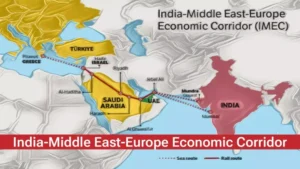Font size:
Print
National Education Day
Context:
Every year, National Education Day is celebrated on November 11, in honour of Maulana Abul Kalam Azad, the first Education Minister of independent India and a visionary educationist.
More on News:
- This day highlights the importance of education in shaping the nation’s future and commemorates Azad’s contributions to the Indian educational system.
- With 65% of India’s population under the age of 35, it is crucial to offer opportunities for quality education and skills development, empowering the youth to drive the nation towards progress.
According to the All India Survey on Higher Education (AISHE) 2021-2022, there has been a 32% increase in female enrolment in higher education, reflecting a steady trend towards gender parity in education. The Gender Parity Index (GPI) reached 1.01, signifying more female students enrolled in higher education than male students. Moreover, enrolment in STEM disciplines has been rising steadily, with 98.5 lakh students in undergraduate, postgraduate, and Ph.D. programs.
History and Significance:
- Maulana Abul Kalam Azad, born on November 11, 1888, was a scholar, educationist, and senior leader of the Indian National Congress.
- He played a pivotal role in establishing several prestigious educational institutions, including the University Grants Commission (UGC), the All India Council for Technical Education (AICTE), and the first Indian Institute of Technology (IIT) in Kharagpur.
- His vision for education emphasised the importance of scientific knowledge and basic education for all.
- In September 2008, the Government of India declared November 11 as National Education Day to honour Azad’s legacy and his efforts in promoting education as a fundamental right.
The theme for 2024:
- The theme for National Education Day 2024 is “Inclusive Quality Education”.
- This theme underscores the importance of providing high-quality education that equips individuals with the necessary skills and knowledge to thrive in a changing world.
- It also emphasises fostering critical thinking, creativity, and emotional intelligence among students.
Government Initiatives and Programs:
- Constitutional Provisions & Legal Frameworks:
- 86th Amendment of the Constitution (Article 21-A) guarantees free and compulsory education for children aged 6-14.
- The Right to Education (RTE) Act, 2009 ensures quality elementary education for all children.
- National Education Policy (NEP) 2020: Approved by the Cabinet on July 29, 2020, aiming to overhaul India’s education system for the 21st century, focusing on inclusivity and modernisation.
- PM SHRI Scheme (PM Schools for Rising India): Launched in September 2022, aims to strengthen over 14,500 schools across India, in line with NEP 2020, with a project cost of ₹27,360 crore.
- Samagra Shiksha (Integrated Scheme): Launched on April 1, 2021, focuses on inclusive education for all children, particularly those from diverse backgrounds, until March 2026.
- PRERNA Initiative: Launched as a residential program for students (Class IX to XII), blending heritage with technology to inspire and provide experiential learning (pilot phase in Gujarat, 2024).
- ULLAS (New India Literacy Programme): Aimed at adult literacy for individuals aged 15+ who missed formal schooling, running from 2022-2027, aligned with NEP 2020.
- NIPUN Bharat: Launched on July 5, 2021, focusing on foundational literacy and numeracy by the end of Grade 3 by 2026-27.
- Vidya Pravesh: Guidelines for a play-based transition module for Grade-I students, launched on July 29, 2021.
- Vidyanjali: A volunteer program launched on September 7, 2021, to improve school education quality through community and corporate support.
- DIKSHA Platform: Launched on September 5, 2017, for teacher training and development, empowering educators across India with flexible tools for personalised education.
- SWAYAM Plus: Launched on February 27, 2024, focuses on skill development and employability, integrating industry-relevant courses into higher education.
- NISHTHA Program: Launched in 2019, aimed at enhancing the professional development of elementary school teachers, transitioning to an online format in 2020 during COVID-19.
- NIRF (National Institutional Ranking Framework): Introduced in 2015 to rank higher educational institutions, encouraging competition and quality improvements.
- PM-Vidyalaxmi Scheme: Approved to provide financial assistance for higher education loans to meritorious students, benefiting over 22 lakh students annually with a budget of ₹3,600 crore (2024-2031).
Education Budget for FY 2024-25:
- India’s path to global leadership is intrinsically linked to the strength of its education system.
- In the FY 2024-25 budget, a record ₹73,498 crore has been allocated to the Department of School Education & Literacy, representing a 19.56% increase over the previous year.
- Substantial investments have been made in autonomous bodies such as Kendriya Vidyalayas (KVS) and Navodaya Vidyalayas (NVS), with ₹9,302 crore and ₹5,800 crore allocated, respectively. These investments will strengthen infrastructure and improve the quality of education across the country.

